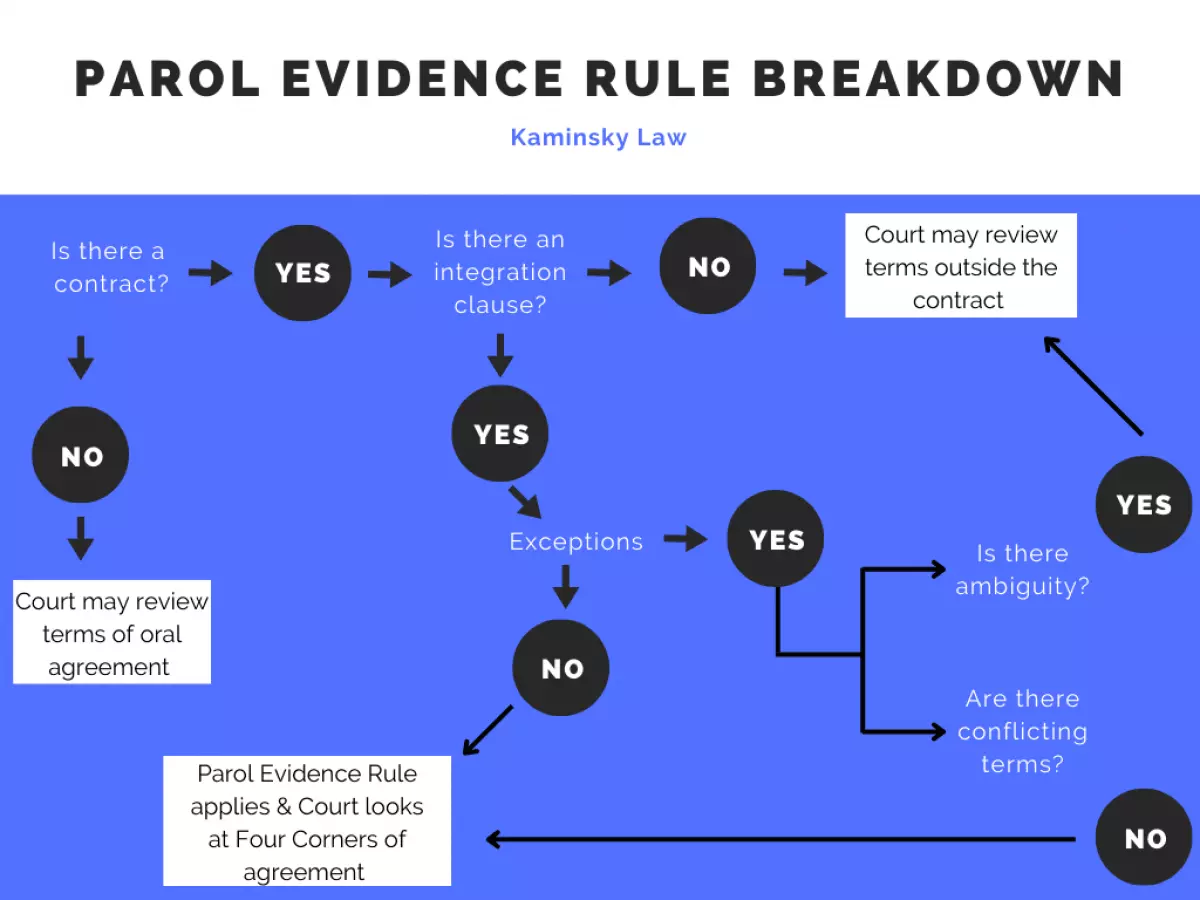 Flowchart to breakdown the Parol Evidence Rule.
Flowchart to breakdown the Parol Evidence Rule.
In the world of contract law, the Parol Evidence Rule plays a crucial role in interpreting and deciding lawsuits related to written contracts. But what exactly is this rule, and how does it impact your contracts? Let's delve into the details to gain a better understanding.
The Parol Evidence Rule
The Parol Evidence Rule, applicable in Pennsylvania, prohibits the consideration of outside information when a court interprets or decides a lawsuit about a written contract. This includes prior conversations, documents, emails, and any other form of communication between the parties involved.
The underlying principle of the Parol Evidence Rule is simple - if you wanted something included in the agreement, you should have included it in the written contract itself. To reinforce the application of this rule, parties can include an "integration clause" in their agreement. This clause ensures that all intended terms are incorporated within the written contract, leaving no room for external factors to influence the agreement's terms.
Exceptions to the Parol Evidence Rule
While the Parol Evidence Rule generally stands firm, there are a few exceptions worth noting. These exceptions include situations where there is ambiguity or conflicting terms within the written contract.
Ambiguity
An ambiguous term, as defined by Merriam-Webster, refers to "a word or expression that can be understood in two or more possible ways." When it comes to contracts, ambiguous terms can lead to conflicting interpretations by different parties. To avoid such confusion, it is advisable to include a definition or clause in the contract that clarifies specific details, such as the type of currency to be used for payment.
A written contract that is detailed and thorough greatly reduces the chances of ambiguity. Remember the cautionary tale of Jodee Berry, who thought she won a Toyota but ended up with a Toy-Yoda. A well-drafted contract eliminates any ambiguity and ensures all parties are on the same page.
Conflicting Terms
Conflicting terms in a written agreement create another exception to the Parol Evidence Rule. This occurs when one part of the contract contradicts another, often resulting from the reuse of outdated contracts or the use of generic templates found online.
To prevent conflicting terms, especially in complex contracts, it is crucial to meticulously review every section and ensure consistency throughout. Any violation within the contract's provisions can potentially lead to legal disputes and complications.
The Impact of Ambiguity or Conflicting Terms
If your written contract contains ambiguous or conflicting terms, the court or fact finder can review terms that extend beyond the contract itself. This includes analyzing the intentions of the parties involved, as well as other discussions or evidence leading up to the contract.
However, if the agreement is clear and devoid of any ambiguity or conflicting terms, the Parol Evidence Rule holds firm. In such cases, the court restricts its consideration solely to the "Four Corners" of the agreement. The Four Corners principle asserts that the meaning of a document should be derived from its language and the matters encompassed within it. Only under valid exceptions to the Parol Evidence Rule can the court consider evidence beyond the contractual agreement.
Seek Professional Assistance
To ensure the legality and effectiveness of your contracts, it is always advisable to seek the expertise of a local Pennsylvania lawyer. Whether you need assistance in drafting new agreements or reviewing existing ones, a business lawyer or contract lawyer can provide valuable insights and protect your best interests.
Kaminsky Law is a reputable law firm with extensive experience in business disputes, business litigation, and employment law - all of which revolve around various types of contracts. Contact Kaminsky Law today at 215-876-0800 or fill out their contact form for a free consultation.
Watch Informative Videos
For a brief overview of the Parol Evidence Rule and its exceptions, watch the following videos by Kaminsky Law:
- Parol Evidence Rule - Dig deeper into the Parol Evidence Rule and understand its significance.
- Exceptions to the Parol Evidence Rule - Explore the exceptions to the rule and how they can impact contract interpretation.
Remember, understanding the Parol Evidence Rule and its implications can empower you to navigate the complex world of contracts with confidence and protect your rights effectively.











